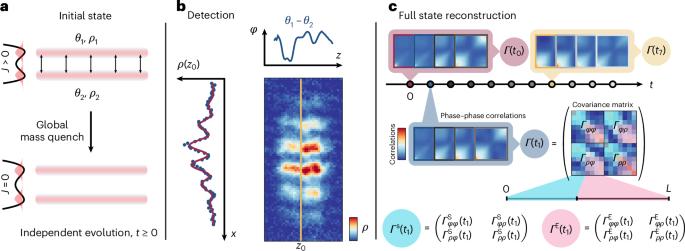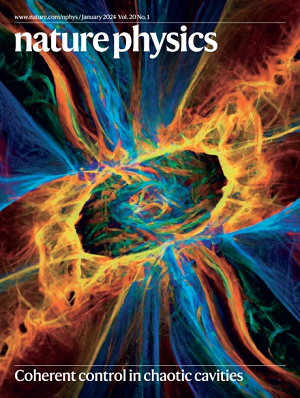在量子多体体系中实验探索兰道尔原理
IF 18.4
1区 物理与天体物理
Q1 PHYSICS, MULTIDISCIPLINARY
引用次数: 0
摘要
兰道尔原理通过将系统在过程中的熵变与耗散到环境中的平均能量联系起来,架起了信息论和热力学的桥梁。虽然通常在擦除单个信息的背景下讨论,但兰道尔原理可以推广到描述非平衡过程中的不可逆性,例如涉及复杂量子多体系统的过程。具体来说,系统的熵变与耗散到环境中的能量之间的关系可以分解为量子互信息的变化和环境相对熵的差异。本文利用超冷玻色气体的量子场模拟器,对量子多体体系中的兰道尔原理进行了实验研究。采用动态层析重建方案,我们跟踪了从有质量到无质量Klein-Gordon模型的全局质量猝灭后量子场的时间演化,并分析了复合系统中各种系统环境分区对广义熵产生的热力学和信息论贡献。我们的结果验证了量子场理论计算,用半经典准粒子图解释。我们的工作证明了基于超冷原子的量子场模拟器实验研究量子热力学的能力。本文章由计算机程序翻译,如有差异,请以英文原文为准。


Experimentally probing Landauer’s principle in the quantum many-body regime
Landauer’s principle bridges information theory and thermodynamics by linking the entropy change of a system during a process to the average energy dissipated to its environment. Although typically discussed in the context of erasing a single bit of information, Landauer’s principle can be generalized to characterize irreversibility in out-of-equilibrium processes, such as those involving complex quantum many-body systems. Specifically, the relation between the entropy change of a system and the energy dissipated to its environment can be decomposed into changes in quantum mutual information and a difference in the relative entropies of the environment. Here, we experimentally probe Landauer’s principle in the quantum many-body regime using a quantum field simulator of ultracold Bose gases. Employing a dynamical tomographic reconstruction scheme, we track the temporal evolution of the quantum field following a global mass quench from a massive to a massless Klein–Gordon model and analyse the thermodynamic and information-theoretic contributions to a generalized entropy production for various system–environment partitions of the composite system. Our results verify the quantum field theoretical calculations, interpreted using a semi-classical quasiparticle picture. Our work demonstrates the ability of ultracold atom-based quantum field simulators to experimentally investigate quantum thermodynamics. Landauer’s principle connects entropy and energy dissipation in non-equilibrium processes. An experiment now uses this principle to measure entropy production in a Bose gas to resolve contributions from correlations and dissipation.
求助全文
通过发布文献求助,成功后即可免费获取论文全文。
去求助
来源期刊

Nature Physics
物理-物理:综合
CiteScore
30.40
自引率
2.00%
发文量
349
审稿时长
4-8 weeks
期刊介绍:
Nature Physics is dedicated to publishing top-tier original research in physics with a fair and rigorous review process. It provides high visibility and access to a broad readership, maintaining high standards in copy editing and production, ensuring rapid publication, and maintaining independence from academic societies and other vested interests.
The journal presents two main research paper formats: Letters and Articles. Alongside primary research, Nature Physics serves as a central source for valuable information within the physics community through Review Articles, News & Views, Research Highlights covering crucial developments across the physics literature, Commentaries, Book Reviews, and Correspondence.
 求助内容:
求助内容: 应助结果提醒方式:
应助结果提醒方式:


